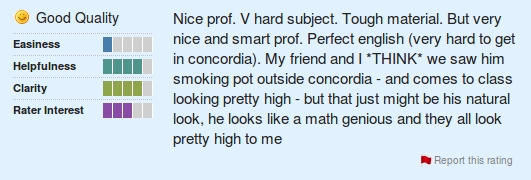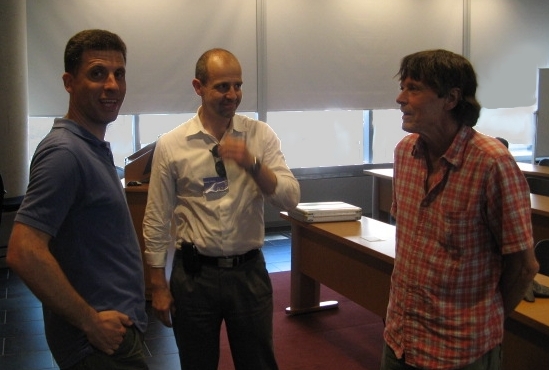We enter Au Bistro Gourmet, steps away from Concordia University's Engineering Department, armed with a bottle of white and a bottle of red, on a quiet Monday night.
LvV: In the spring of 2007 there was a workshop here in Montreal to commemorate your 60st
birthday. According to our computations, that means we are close to you 65th..
SD: Indeed, it just passed. I wanted to let it pass quietly. In fact, I just got my
research grant renewed for five years by NSERC. When I met Hinke Osinga and Bernd
Krauskopf in Bristol last week, I told them: "Five years, that will take me to sixty!".
But they caught me out...
LvV: That is great news about the grant! You are still balancing research, teaching
and service. Are you considering giving up one or two of these responsibilities and
concentrating on the others?
SD: Recently, a colleague and friend, Tien Bui, took partial retirement from our department.
Now he is pretty much free to do what he wants, still with a decent income. I will
look at the possibilities, it is very tempting. I still enjoy teaching, though. Unfortunately,
many students in Computer Science hate math. Still I get good course evaluations.
Somehow they hate math more than they hate me!

A particularly amusing assessment of Sebius on ratemyprofessors.com.
LvV: Recently, is has been getting harder in Canada to obtain research grants. The trend
is to give higher grants to fewer people and link more grants to industrial collaboration.
What is your opinion about this development?
SD: I think it is a bad idea. Scientific progress involves a lot of luck, researchers feel
around in the dark and every now and then they stumble upon something great. The more
researchers there are feeling around, the greater the chance that exciting new results are
found. I would not mind having a smaller grant, if I knew that more researchers would get
a chance. As for industrial collaboration, of course it is a good idea to collaborate
where it is appropriate, for instance there are interesting projects with Airbus (using AUTO).
But when bureaucrats step in, they tend to make such collaborations
a rule, an expectation, rather than a exception. It does not work like that...
LvV: What do you consider the most exciting work you have done?
SD: Of course developing AUTO was exciting, but perhaps the most exciting work was an
attempt to set up similar algorithms for PDEs. I had an idea for using collocation on
general domains, somewhat similar to discontinuous finite elements methods. For instance,
I wrote a program to solve a Poisson equation in n dimensions. In the FORTRAN code,
n was a parameter. That was twenty five years ago. It was never really published, although
I later had
two students work on the project. One PhD student worked on rectangular elements in
the plane, and one MSc student worked on time-stepping for linear PDEs.
We used an algorithm by María Cecilia Rivara to set up a triangularization recursively.
One reason that not much has been published is that I have no general proof of convergence.
Wei-Wei Sun at CUHK, a former postdoc of Bob Russel, has proven some results for this method,
but it remains a very difficult problem.
Funny thing is that I wrote some of these ideas into
my last NSERC proposal! I was expecting one of the reviewers to say "The applicant has
proposed to do this several times in the past. If the problem hasn't been solved by now,
why would it be solved in the next five years?", but they didn't. It is high-risk research
because nothing might come out of it. But I feel I can now afford to do what I want..
LvV: As opposed to younger researchers?
SD: Right. These days researchers are often forced into a certain type of behaviour, aiming to quickly
publish or perish. You have to exaggerate in your grant proposal, universities exaggerate
when they advertise how great they are, many results are overstated. This could really
lead to the downfall of the credibility of science in the eyes of the public.
LvV: You do not attend the bi-annual Snowbird meeting. Can you explain to our readers why?
SD: Well, that started more than twenty years ago. I was traveling to the US on a visa
waiver with a Dutch passport. Those things were valid for three months, and I overstayed it
by one day. I wasn't even staying in the US, I was just transiting to other countries.
At the border the officer told me the waiver had expired. Maybe I should have apologised
profusely but I did not think much of it. He did, though. Since then every time arrived in
the US I was taken to a kind of interrogation room and made to wait at least an hour. Then
someone would ask some questions about that one day and let me go. One officer suggested
the problem would be solved if I became a Canadian citizen, so I did. But strangely,
they still pick me out of the line. I have to allow for at least two hours between
connecting flights. I grew tired of this and made only two trips to the US in recent years:
one for a workshop commemorating Herb Keller and one for a wedding.
Another reason is that I do not really like big meetings. I much prefer smaller workshops,
like the bifurcation workshops started by Yuri Kuznetsov over twenty years ago (such as the ones in Montreal and Milan) and the workshops
we organised with Carlos Pando in Mexico. That meeting is gathering momentum, next time
it will be in Peru and after that probably in Brazil.

Sebius Doedel with Harry Dankowicz and George Haller at the 2010 Workshop on Bifurcation Analysis and Applications in Montreal.
LvV: The Editorials of DSWeb Magazine have discussed directed spam and open-source publishing.
What is your experience with these matters?
SD: I get invitations to meetings every day, invitations I consider spam. Meetings on islands
in the Mediterranean. "Deadline extended" is usually the headline. And I get invitations
to contribute to journals and book volumes. I fell into that trap once. I was invited to
contribute a review paper on laser modelling and bifurcation analysis. Since it looked legitimate,
I asked Carlos Pando and we submitted an abstract together. But when I mentioned this to
Pankaj Kamthan, a friend and former student, he showed me a web page that revealed this particular
publisher to be a spam publisher. They have a way of putting together a convincing
invitation to contribute, but nobody there knows anything about science. Anybody can
set up an internet page and publish an electronic book. And yes, we did agree to pay $900.
It gets increasingly hard to tell what is bogus. This is very disturbing to me.
LvV: Do you have strong feelings about publishing in journals owned by commercial publishers
as opposed to professional organisations?
SD: I have never been so concerned about that, maybe not enough. I published several papers
in IJBC, owned by World Scientific, where you can include colour figures free of charge.
Of course you are speaking on behalf of SIAM! SIAM journals have a great reputation, and in
fact Hinke, Bernd and I are planning to submit our next paper on the Lorenz manifold to
SIADS.
You know, citations counts and impact factors did not use to play such a great role.
I published the main paper on AUTO in Congressus Numerantium, a small journal published
in Manitoba. In part, I did this because I had come back to Canada and wanted to support
a Canadian journal. In a way, this was a big mistake since this journal has little visibility.
But in those day I simply did not worry much about that.
LvV: Have you never considered publishing a new paper on AUTO in a journal like ACM Transactions
on Mathematical Software? That might help you get more citations...
SD: Yes, maybe - in the far future (laughs and finishes of the white wine). In fact, I am very skeptical
about such metrics.
At a dinner in Bristol, Hinke asked me who would maintain AUTO, I suppose she meant
after my demise. I said "I don't care, après moi le déluge!". There are other people that
take over, for instance MatCont and COCO incorporate many ideas from AUTO and contain
many new ideas.
Lennaert van Veen